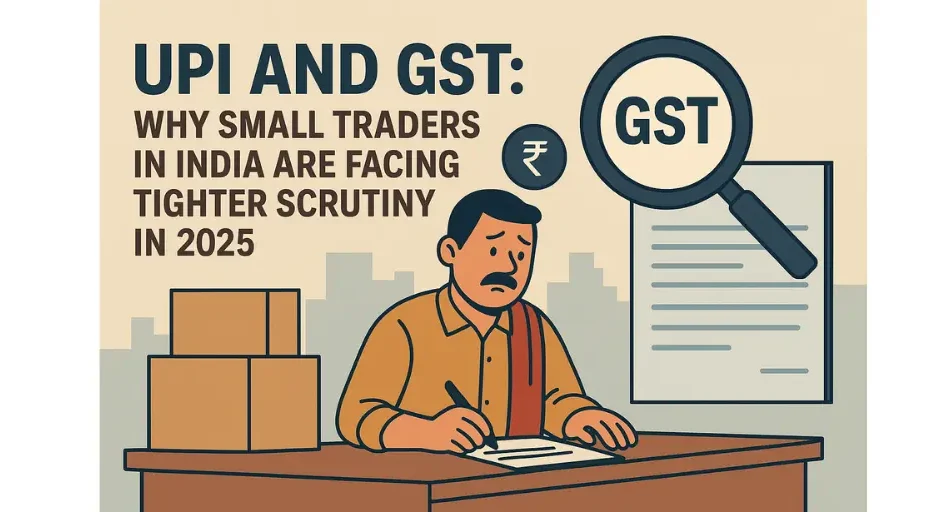UPI and GST: Why Small Traders in India Are Facing Tighter Scrutiny in 2025
In 2025, the Indian government is ramping up efforts to ensure better tax compliance among small traders. Two key pillars of this initiative are the Unified Payments Interface (UPI) and the Goods and Services Tax (GST). Together, these tools are creating tighter scrutiny on small businesses, fundamentally changing how they operate. For many small traders, this means facing increased challenges but also opportunities to streamline operations and grow.
In this blog, we explore why small traders in India are facing tighter scrutiny due to UPI and GST, and what it means for gst for small business compliance in 2025.
The Growing Importance of UPI in Small Business Transactions
UPI has revolutionized digital payments in India, becoming the preferred mode of payment for millions of small businesses. Its simplicity, low cost, and instant transfer capability have made it indispensable. However, with increasing UPI adoption, the government has begun using UPI transaction data as a tool to track unreported income and ensure tax compliance.
For small traders, this means that every transaction through UPI is potentially subject to scrutiny under GST rules. The government’s aim is to bridge the gap between reported sales and actual transactions by monitoring UPI payments closely.
How GST for Small Business Is Evolving in 2025
The Goods and Services Tax (GST) regime was introduced to simplify indirect taxation, but compliance has always been a challenge, especially for small traders. In 2025, the government has introduced stricter rules, enhanced digital monitoring, and data analytics to identify discrepancies.
One key focus is the linkage of UPI data with GST filings. This integration helps tax authorities detect inconsistencies in reported turnover. For small businesses that are either under-reporting or not registering for GST despite crossing thresholds, the risk of receiving notices and audits has increased significantly.
Why Small Traders Are Facing Tighter Scrutiny
-
Increased Digital Footprint: With the rise of digital payments, small traders have left a traceable trail of financial transactions. This transparency makes it easier for authorities to identify anomalies between UPI transactions and GST declarations.
-
Lower GST Registration Thresholds: The government is reviewing thresholds for GST registration. Many small traders who previously did not require registration may now be mandated to register and comply.
-
Automated Data Matching: Advanced analytics tools match UPI transaction data with GST returns. Discrepancies can trigger notices, audits, and penalties.
-
Focus on Reducing Tax Evasion: Small traders are often perceived as a segment with high tax evasion risk. Tightening scrutiny is part of a broader strategy to widen the tax base and boost compliance.
What Small Traders Must Know About GST for Small Business in 2025
If you are a small trader, understanding the evolving GST landscape is crucial:
-
Timely GST Registration: Ensure your business is registered if your turnover crosses the prescribed limits. Avoid penalties by complying early.
-
Accurate Reporting: Match your sales and purchase data with UPI transaction records to avoid discrepancies during audits.
-
Maintain Digital Records: Keep clear, digital records of all transactions including UPI payments. This will help during GST assessments.
-
Use GST-Compliant Software: Employ accounting and billing software that integrates GST filing with UPI transaction reconciliation.
Challenges Faced by Small Traders
While these measures enhance compliance, small traders face several challenges:
-
Complexity in Compliance: For many small businesses, GST filing and reconciliation with UPI data can be overwhelming.
-
Cost of Compliance: Investing in digital tools and possibly professional help increases costs.
-
Fear of Scrutiny: The prospect of audits and penalties creates anxiety among traders unfamiliar with tax laws.
Opportunities for Small Traders
Despite the challenges, the tighter GST and UPI scrutiny also presents opportunities:
-
Improved Business Transparency: Digital transactions build credibility with suppliers, customers, and lenders.
-
Access to Formal Credit: GST-compliant businesses have easier access to loans and credit lines from financial institutions.
-
Streamlined Operations: Adoption of digital payments and GST compliance software can improve overall business efficiency.
Tips for Small Traders to Navigate GST for Small Business Compliance
-
Stay Updated: Regularly follow GST notifications and changes in thresholds.
-
Leverage Government Resources: Use online GST portals, tutorials, and helplines.
-
Consult Professionals: Seek advice from accountants or GST consultants familiar with small business challenges.
-
Educate Your Team: Train employees or family members handling accounts about GST and UPI requirements.
The Future Outlook: Digital Payments and GST Compliance
The government’s focus on integrating UPI data with GST filings is a clear sign that digital payments and tax compliance will become increasingly intertwined. For small traders, this means adopting digital tools and understanding GST for small business is no longer optional but necessary.
With tighter scrutiny expected to continue, small traders who adapt early will benefit from smoother compliance, reduced risk of penalties, and better growth prospects.
Conclusion
In 2025, the convergence of UPI and GST is reshaping the regulatory environment for small traders in India. Tighter scrutiny is a response to the growing digital footprint of transactions and the government’s push to improve tax compliance.
For any small trader, focusing on gst for small business compliance is critical to navigate these changes successfully. By embracing digital payments, maintaining accurate records, and staying informed about GST rules, small businesses can transform these challenges into growth opportunities
Our GST Services

All E-commerce Tax services
E-commerce tax services help online sellers navigate GST registration, compliance, return filing, TCS management, tax planning, and audits, ensuring efficient tax management and legal compliance.

GST Filing
GST filing is the process of submitting tax returns to the government, detailing sales, purchases, and taxes paid or collected, ensuring compliance with GST laws.

GST Registration
GST registration is the process where businesses obtain a GSTIN from the government, allowing them to collect taxes, claim input tax credits, and comply with GST laws.





